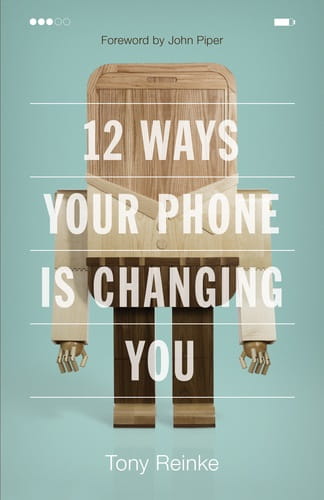10 Things You Should Know about Your Smartphone

This post is compiled and adapted from various portions of 12 Ways Your Phone Is Changing You by Tony Reinke. The following article first appeared on Crossway.org as part of the 10 Things You Should Know blog series; used with permission.
1. Your smartphone is not all bad.
My smartphone is my untiring personal assistant, my irreplaceable travel companion, and my lightning-fast connection to friends and family. VR screen. Gaming device. Ballast for daily life. My intelligent friend, my alert wingman, and my ever-ready collaborator.
2. Your smartphone is not all good.
Study after study has shown that too much time on our phones has profound effects on our physical health, including (but not limited to) inactivity and obesity, stress and anxiety, sleeplessness and restlessness, bad posture and sore necks, eye strain and headaches, and hypertension and stress-induced shallow breathing patterns.
The physical consequences of our unwise smartphone habits often go unnoticed, because in the matrix of the digital world, we simply lose a sense of our bodies, our posture, our breathing, and our heart rates.
3. Your smartphone amplifies your addiction to distractions.
We check our smartphones about 81,500 times each year, or once every 4.3 minutes of our waking lives. While our relationships with our phones may not be lifelong covenant relationships (though carrier contracts can feel like it), I would not be the first to suggest that owning a smartphone is similar to dating a high-maintenance, attention-starved partner.1
4. Your smartphone pushes you to evade the limits of embodiment.
We try to break through the boundaries of time and space, and we end up ignoring the flesh and blood around us. In reality, we are finite. We assume that we can drive cars and read and write on our phones all at the same time, but we are weaker than our assumptions.
To exist is to be walled in by physical limitations—boundaries and thresholds that limit what we can perceive and accomplish. When we always see our lives through glass, we forget that we are made of flesh and blood.
5. Your smartphone feeds your craving for immediate approval.
Smartphones prick the primitive human impulse for appreciation—self-replication in order to be seen, known, and loved—through constant contact with other seekers of affirmation. This is one reason why we find it so hard to put our phones away. We fear one another, and we want admiration from one another, so we cultivate an inordinate desire for human approval through our social media platforms.
6. Your smartphone undermines key literary skills.
Our entire faith is built on a book, and inside that book are sixty-six smaller books. Our spiritual life is fed by books within books, like Ezekiel’s wheels inside wheels. And new Christian books are released every day around the world. Books are a big deal for Christians. We treasure the press. Publishing is part of gospel mission. Wherever the gospel has spread, so has literacy.
Yet in the digital age, books have become more vulnerable to the label boring. Compared to the latest game or streaming television series, staring at black and white shapes for several hours seems like a silly investment. We have been initiated into a kind of entertainment-convenience that makes books feel downright outdated, inconvenient, and far too demanding.
7. Your smartphone offers a buffet of produced media.
Not only do our smartphones have sharp cameras that capture quality images and video, those cameras are always with us, and we have developed fidgety “shutter” trigger fingers, ready to capture anything in the moment. Taken together, we not only consume celebrity culture, we now feed the culture, too.
8. Your smartphone overtakes and distorts your identity.
We bend over our phones—and what most quickly captures our attention is our own reflection: our replicated images, our tabulations of approval, and our accumulated “likes.” Social media has become the new PR firm of the brand Self, and we check our feeds compulsively and find it nearly impossible to turn away from looking at—and loving—our “second self.”2
When we talk about “smartphone addiction,” often what we are talking about is the addiction of looking at ourselves.
9. Your smartphone need not have these negative affects on you.
There are some vital life disciplines we need to implement to preserve our spiritual health in the smartphone age.
We minimize unnecessary distractions in life to hear from God and to find our place in God’s unfolding history. We embrace our flesh-and-blood embodiment and handle one another with grace and gentleness. We aim at God’s ultimate approval and find that, in Christ, we have no ultimate regrets to fear. We treasure the gift of literacy and prioritize God’s Word. We listen to God’s voice in creation and find a fountain of delight in the unseen Christ. We treasure Christ to be molded into his image and seek to serve the legitimate needs of our neighbors.
10. Your smartphone can be a tool for knowing and enjoying God.
Scripture makes life focus possible in the digital age, and it does so when Jesus boils down the purpose and aim of our lives into two goals: treasure God with your whole being, and then pour out your God-centered joy in love for others. On these two commands all other smartphone laws depend.
When we use our smartphones rightly, their shining screens radiate with the treasure of God’s glory in Christ, and in that glory-glow, we get a sneak peek into a greater age to come.
Notes:
1. Jacob Weisberg, “We Are Hopelessly Hooked,” The New York Review of Books (Feb. 25, 2016).
2. Sherry Turkle, The Second Self: Computers and the Human Spirit (Cambridge, MA: MIT Press, 2005).
Be sure to take a look at Crossway's phone usage infographic for more statistics related to the many ways our phones are changing us—for better and for worse.

Image courtesy: Pexels.com
Publication date: August 18, 2017
Originally published August 18, 2017.





